Prague’s forestry service has announced they will be planting 128,000 tree saplings during autumn, after bark beetles devastated the population.
Despite the cold temperatures of the spring, the pests were not deterred, and around 70,000 diseased trees had to be felled. In other words; almost a third of the wood that was harvested this year was done so due to the infestation.
Petra Fišerová, of the forestry organization Lesy města Prahy, explains: “In the spring of this year, we planted more than 107,000 trees in the Prague forests; during the autumn, we plan to plant another almost 130,000 seedlings.
Almost 70,000 of them will be filled with loose clearings, which remain in the forests mainly after diseased trees felled due to bark beetle infestation. We will plant the remaining 60,000 young trees in newly afforested areas.”
Due to the bark beetle, conifers are being withdrawn from the projects. The exact species of the seedlings will depend on the immediate suitability of the habitat but it will not be spruce, which hasn’t been planted in Prague forests for some time.
Petr Hlubuček, the deputy mayor for safety and the environment, discussed Prague’s green spaces: “In the last 20 years, 250 hectares of new green space have been created and financed by Prague.
All planting costs and subsequent maintenance, which is often more expensive than primary planting, are covered by the metropolis from its budget.”
Specifically, projects will include planting 26,400 trees in Kunratice’s Na Musile forest, and 16,000 trees in Horní Počernice which will flourish around the revitalized Xaverov ponds and the restored bed of the Svépravický Brook.
A Museum that will explore the creation, rise and fall of totalitarian regimes in Czechoslovakia is coming to its capital city.
The initial exhibitions will focus on totalitarianism. And one infamous object has already been donated to the cause; the bronze statue of Soviet marshal Ivan Konev. The decision did not come without controversy.
The statue was pulled down from its plinth in April 2020, under backing from Mayor Ondřej Kolář and the Prague 6 administration. As Mayor Kolář described this move as “the imaginary last note in the etude that took place in 1980 in Bubenec”, Czech President Miloš Zeman’s spokesman Jiří Ovčáček condemned the removal.
Ovčáček argues that pulling down the statue is an attempt to “erase the memory”, yet moving it to a museum will bring its history to public attention. Before its removal historian Petr Blažek, who has been recommended for the museum board, stated that: “It would be better if this discussion around the Konev statue took place in a museum, where it would be accompanied by contemporary film recordings of its unveiling [in 1980], ], as well as with a factography that would document marshal Konev’s personality in more detail.”
Plans to build a ‘Museum of 20th Century Memory’ were unanimously voted in by Prague’s City Council in September 2019. It was officially registered with the Court Registry on 17 November.
The United Force for Prague party has suggested Strahov Stadium, which would need to be repaired to the cost of CZK 1.2 billion.
Councillor Hana Kordová Marvanová, who authored the proposal, explained that the inspiration came from similar museums such as the Topography of Terror in Berlin, Warsaw Rising Museum in Poland, the Museum of the Second World War in Gdansk and Yad Vashem in Jerusalem.
Although the coronavirus pandemic may have stilted plans, the plan is to open by the beginning of the municipal elections in 2022.
According to a global survey of expats, the Czech Republic is more commitment to environment and sustainability than its neighbours Poland and Slovakia. But it’s miles behind ratings of Austria and Germany.
In early spring 2020, before coronavirus had spread across the world, InterNations asked more than 15,000 people to participate in their Expat Insider survey. Their results ranked countries based on environmental related issues.
Czechia didn’t fair too badly. Whilst it trailed behind Nordic countries such as Finland, it sailed ahead of the UK and countries across Asia while performing better than the global average. It sat at number 16 out of 60 countries and nearly all expats (97%) rate the country’s natural environment positively, compared to 82% globally.
The region settled at number 15 in the ‘Products & Utilities’ and the ‘Quality of Environment’ subcategories. The Products and utilities questions ask expats to rate the availability of green goods and services, such as renewable energy, organic food, and sustainable products. Additionally, they rated the country’s energy supply and it’s waste management and recycling efforts.
Meanwhile, the quality of the environment category looks at satisfaction with the natural environment, the local air quality, as well as water and sanitation. Only 74% of expats are satisfied with the local air quality in Czech, significantly less than 92% of respondents in Finland. However, one Russian expat did name “the beauty of the environment’’ as one of the best things about living in Czechia.
According to expats, political backing of and public interest in environmental issues is where the Czech Republic falls short. Coming in at 23rd place, just to three in five respondents (57%) agree that the government supports policies to protect the environment, which almost matches the 55% global average.
Respondents to the survey represent 173 nationalities who live in 181 countries or territories worldwide. Data was collected before the peak of the pandemic.
Polish artist Mariusz M-City Waras, known for his striking black and white cityscapes, has painted a mural on a facade in Nadrazni street, Ostrava.
“We tried to feel the pulse of the city, to reveal its personal rhythm and charm,” Mariusz M-City Waras explains. “One of the fundamental tasks was to find a certain symbol, a metaphor, something understandable and close to every citizen – not to deploy a foreign thing to which no one has a relationship.”
This scene of a robotic, leaping horse has revitalised a once plain, ordinary building in Ostrava.
Alexandra Krolikova, an independent art curator who focuses on street art, explains that when planning the piece, herself and Mariusz were “looking for a secret sign, understandable for all the inhabitants of Ostrava, a common cultural code.”
She added: “The painting will contain an allegory, metaphor and aesthetics of urbanism, focusing on the uniqueness of Ostrava and its stories.”
The artist
Mariusz Waras, better known as M-City, is an artist from Poland, whose large-scale stencils create imagined cityscapes inspired by impressions from his childhood. He was born in the late 1970s and grew up in Gdynia, Poland, surrounded by an industrial landscape of factories, hydroelectric plants, chimneys, and cranes. These structures feature heavily in the intricate designs of his murals.
After graduating from the Department of Graphic Art at the Academy of Fine Arts in Gdansk, he developed his style of piecing together hundreds of carefully cut stencils to create coherent agglomerations of buildings and objects. He works on a huge scale, with pieces spanning up to 85 meters long. When he isn’t out on the street, his work is featured in galleries, including the opening of URBAN NATION Museum in 2017.
As part of the M-City project, he created more than 700 murals in cities across the world. These include Warsaw, Gdansk, Berlin, Paris, Budapest, Sao Paulo, Rio de Janeiro, Bolzano, London and, of course, Prague.

Photo: Radim Kolibík

Photo: Radim Kolibík

Photo: Radim Kolibík

Photo: Radim Kolibík

Photo: Radim Kolibík
As many as 47 per cent of Prague hotels could close by the end of the year, the president of the Association of Hotels and Restaurants of the Czech Republic, Václav Stárek, has warned.
They also state that closures could hit 30 per cent of hotels in other regions of the country, while the hotel industry as a whole will take at least three years to recover.
According to a survey by the association, most hoteliers estimate that attendance by the end of the year will sit between six and ten per cent of the normal rate.
Another problem is that corporate events have almost completely disappeared. The use of conference facilities has been at one-tenth of normal since the beginning of the year.
Read: Czech Republic to Buy Three Million Vaccines
In the second quarter, the number of overnight stays decreased by 66.7 per cent for Czechs and by 96.2 per cent for foreign guests. In the second quarter, 988 thousand guests were accommodated in hotels and similar establishments, which represented a year-on-year decrease of 82.9 per cent which accounts for 4.8 million guests.
Read: Today Starts the State of Emergency. What You Need to Know
It can be assumed that the numbers for Czech guests will improve. However, in the second quarter, Czech people alone did not compensate for the shortage of foreign guests.
On the contrary, Czechs spent fewer nights in hotels, despite the fact that the government encouraged holidays in the country.
Vinohradská Vodárna, a building in Prague 10 which was originally built as a water tower but now serves as offices and apartments, will be completely changed within four years.
Five institutions and companies presented a new plan for a unique Hydropolis Prague water supply education centre.
Pavel Válek from the Prague Water Management Company said they have been planning the reconstruction of the tower for several years. “I am glad that, thanks to the initiative of PVK and Veolia Group, we will finally be able to expand the project with unique exhibitions that will make it possible to turn the building into a water supply education centre,” he added.
Petr Hlubuček, Prague Deputy Mayor for the Environment, also commented: “This project will make it possible to introduce schools, kindergartens and the general public to water management in a modern way. Through its implementation, we will significantly contribute to understanding the context of the goals of adapting to climate change.”
The new complex will be open to the public in 2024. There will be a public space with multiple water and game elements, a multimedia information centre, educational exhibitions, courses and discussions.
In the tower, visitors can find a conference hall and exposition. Its five underground chambers will be opened up to host, for example, a multimedia hall. There will be a public green space on the surface.
Find the visualisation of these designs below.
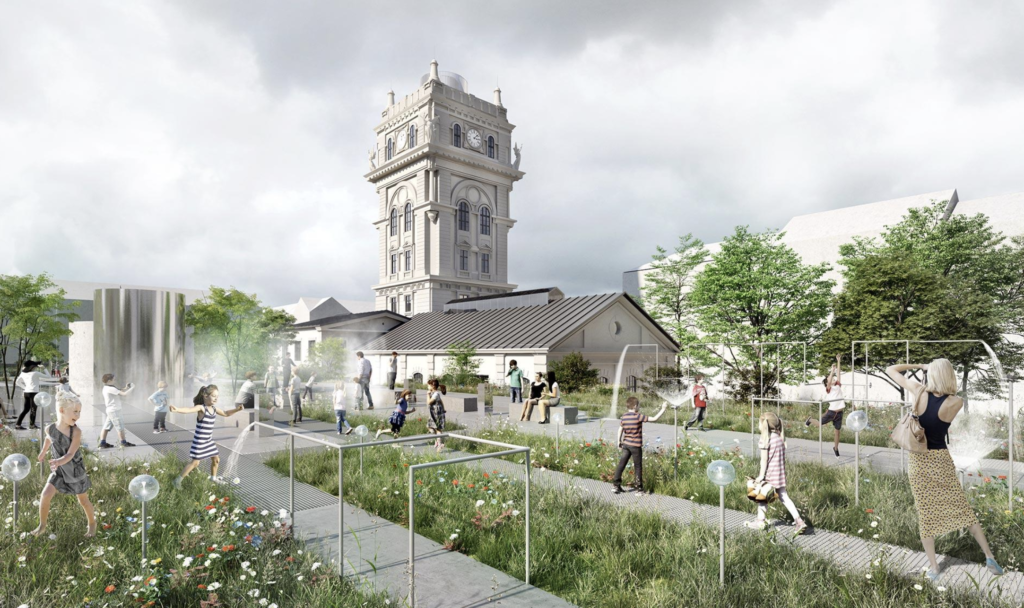
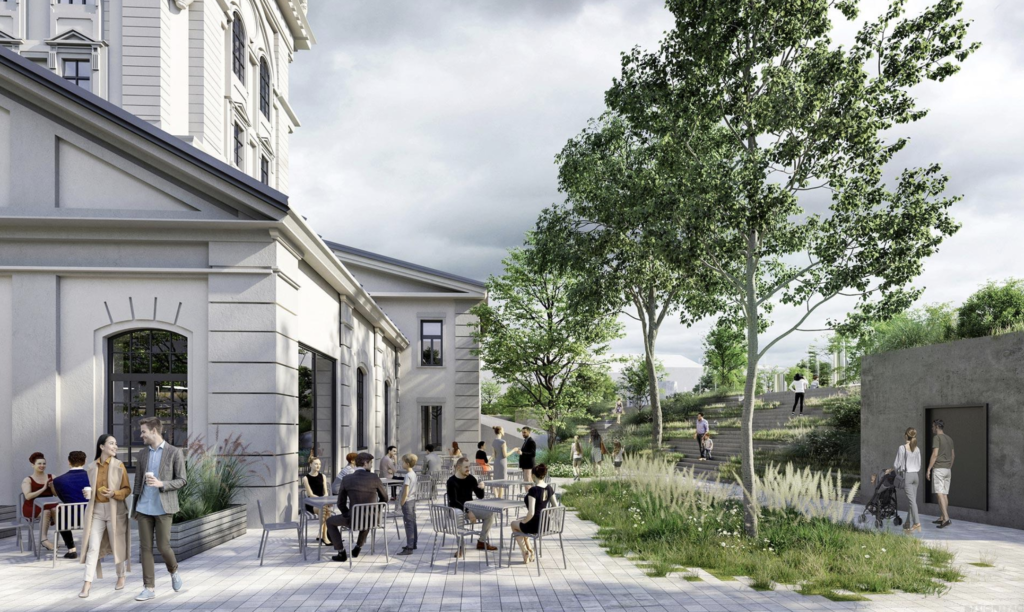
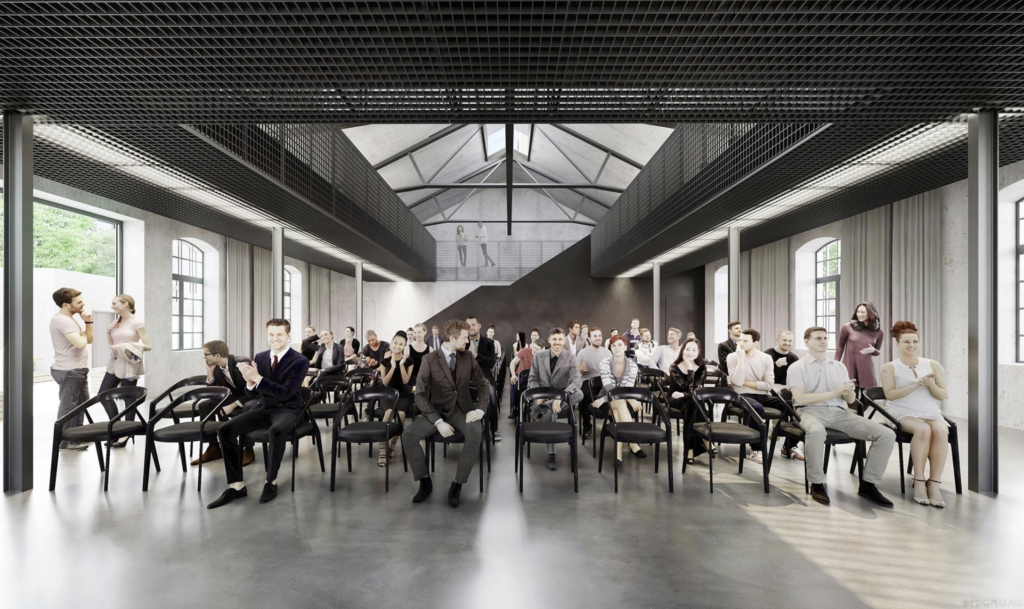
Club Roxy held a protest to ask the Czech government for funding in their ‘last chance to be seen’ before they face closure.
On Wednesday, September 30th, the dance music club bathed itself in red light to show solidarity with the #WeMakeEvents movement, a global day of action that has seen thousands of venues tell those in power that the live events sector urgently needs support to survive the Covid-19 crisis.
Roxy is asking for a grant payment that would cover rent, electricity and gas bills until they can reopen.
The peaceful protests attracted long-time Roxy supporters, resident DJ’s and concerned staff. Hana Makovcová, Roxy’s Head of PR, said that this is their ‘last stab in the dark’ to be noticed.
The clubbing scene has been hit hard by Covid restrictions, and Prague is no exception. Roxy says they have received no real support from the government, forcing them to close permanently in the next month if nothing changes.
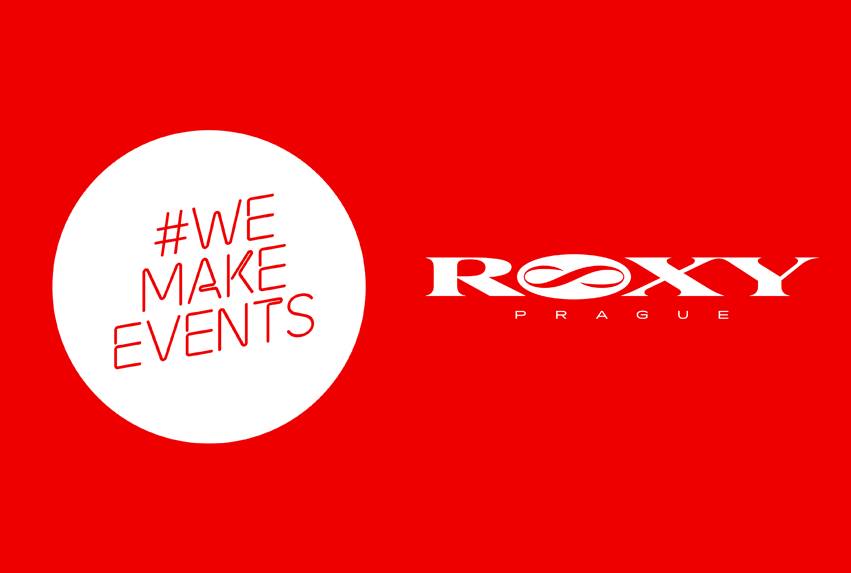
Jaroslav Stanko, the manager of Roxy, said that joining this initiative was a way to raise awareness of their struggle. “Our government doesn’t really care for our industry. We received very little support from our government,” Stanko told Prague Morning. “A lot of creatives venus, like ours, fear for our future. It’s crucial we find a solution to this, now.”
Makovcová also argued that the industry contributes greatly to the Czech economy. “Everything we earn, we return in tax payments. We hope the government understands that without culture there is no bright future. It’s time for the electronic music scene to come together and support venues across the city.”
Club Roxy was first forced to close in March. Three months later they were allowed to reopen. However, they only put on one concert before they had to close again. As restrictions eased in September, Roxy excitedly planned nights with big-name artists such as Little Dragon, Joris Voorn and Adriatique. They’ve since had to postpone these events, and many others on their programme. Makovcova says they do not know when they will be able to host them again.

Photo: Roxy on Facebook
The club has managed to stay afloat during the pandemic because of their theatre and bar. Current restrictions state that you cannot have more than ten people indoors and you need to provide seating. This is easy to implement for pubs and restaurants but is clearly not viable for nightclubs.
The closure of Roxy would put scores of dedicated staff, many of whom have only ever worked in the event industry, out of work without any access to government support. It would also leave thousands of Roxy supporters saddened by the loss of a place that gave them lots of fond memories.
Andrej Brabel, who has been coming to the club for years and often DJs there, says being part of the scene has enhanced his life greatly: “Roxy is a club of cultural value. I fear that if it dies it would be replaced by something more generic. It would be a huge loss for the techno scene,” he told us at the protest. “I came here tonight because all I can do is try and make the government take notice.”

Photo: Roxy on Facebook
Staropramen, the second-biggest brewery in the Czech Republic, will test the sale of a hot beer in winter, according to iRozhlas.cz.
“It could replace mulled wine”, said the director of the brewery Zdenek Havlena. The beer is produced in the Pardubice brewery, which the company bought a year ago. According to Havlena, the range of beers in pubs have decreased due to coronavirus. This special hot beer aims to rectify some of this loss.
“We want to test the product at selected Christmas markets. It is an alternative drink that can complement the classic pre-Christmas svařák and punch,” he added.
Due to the virus restrictions in the spring, restaurants reduced the range of beers in their operations, in some cases by as much as half. According to Havlena, specials beers will begin to return to the menu when beer consumption rises to pre-pandemic values.
However, “the company does not plan to narrow its portfolio in the future, which includes import specials Hoegaarden or Leffe.”
In the future, the company expects an increase in mainly non-alcoholic beers and the so-called beer mixes – i.e drinks based on radlers (shandy in English) with lemonade flavours.
Despite the coronavirus pandemic slashing Prague’s beer income by about 15 to 20 per cent, there is still evidence of some growth – at around one-fifth year-on-year.
A regional court in the Czech town of Novy Jičin has sentenced a man referred to as Lubomir S to two years in prison for stealing a vibrator worth 499 CZK.
According to iDNES.cz, such a harsh verdict was delivered because the crime was committed during the state of emergency, a time where liability for committing crimes is greatly increased.
In normal times, the 33-year-old man would face a maximum of three years for stealing a sex toy. However, the state of emergency raised the maximum punishment to eight years in prison.
Prosecutor Magda Dobrovolná addressed the court: “The defendant took the vibrator from the shelf and hid it under his jacket. At the checkout, he paid only for other small purchases. He knew that he was committing theft and knew that there was a state of emergency in the country.”
The court’s decision was also influenced by the criminal history of Lubomir S. He has been previously bought to justice 23 times, mainly for property crimes.
The defence did not agree with the verdict. The lawyer argued that the threat of real prison time is excessive since the theft of a vibrator – even during a state of emergency – does not pose any threat to society.
According to the judge, his decision was based on the motivation for the theft. “If the defendant had stolen for the first time or his act was motivated by hunger, we could consider a lighter punishment,” he continued. “However, every time he promises that he will no longer steal, it regularly happened again,”
The verdict did not come into legal force. The defense side can now appeal against it.
In a surprising bit of good news, two of the largest electricity suppliers in the Czech Republic have announced that your electricity bill will be reduced from October.
Roman Gazdik, a spokesman for global energy firm CEZ Group, confirmed the price of electricity for households across price lists will fall by an average of nine percent from next month.
This means customers will save about 230 crowns for every megawatt-hour (MWh) they use. According to the company, an average household consumes around 3.5 MWh, meaning they would save hundreds of crowns.
Meanwhile, rival company E.ON has claimed that people who switch to their ‘green electricity’ products will save ten percent compared to standard price lists. Spokeswoman Martina Slavíková explained the decision to reward those who switch products. “We want to motivate people to buy green energy, which is more environmentally friendly and which we buy primarily from local producers throughout the Czech Republic,” she said.
These price reductions have been made possible because of the pandemic. CEZ’s Deputy Chairman and Pavel Cyrani, Director of their Business and Strategy Division Electricity, explained: “Gas prices fell during the COVID epidemic and we were able to buy them more cheaply for our customers. We are thus fulfilling our promise that if stock market prices stay low for a longer period, our customers will also benefit.”
In August, CEZ Group revealed that its net profits for the first half of the year reached 14.7 billion crowns, which is an increase of 11%, or 1.3 billion, year-on-year.
Meanwhile, energy company Innogy claims that its standard price offer of electricity for households is cheaper than the announced reduction of ČEZ, as they are ‘projecting an annual price drop’, a spokesman claimed. Bohemia Energy also claims to guarantee a lower price than the dominant supplier.
While exploring the area of Petrské náměstí, you may not expect to discover a slice of Punjabi royalty nestled opposite the gothic shape of St.Peter’s Tower. But that’s exactly what the K- The Two Brothers restaurant has bought to the riverside area of Prague 1.
Since it opened in 2014, the two real-life brothers who run the restaurant have served delicious North Indian food in a luxuriously decorated restaurant fit for a king.
Prague Morning met with front-of-house manager Sumit to discuss their story over a curry, rice, and naan. “I never planned to open my restaurant in Prague. I wanted to set up in New Dehli,” he admits. “But after I visited the city in 2011 following a trip to Poland for my brother’s wedding, I fell in love and had to completely change my mind.”
As soon as I saw the building we are now based in I asked my brother: ‘This place has potential, shall we go for it?’ Soon enough we had bought the lease and spent the next eight months renovating the space.”
When you visit The Two Brothers, you step into a portal to ancient Kapurthala, once an Indian kingdom. “I was determined to represent India – and specifically the town of Kapurthala where my parents lived- authentically,” he said. “I wanted my restaurant to represent the bringing together of Punjabi and Czech culture over food.” Sumit’s quest for authentic representation doesn’t stop at the food, which is cooked by his brother, Rony.
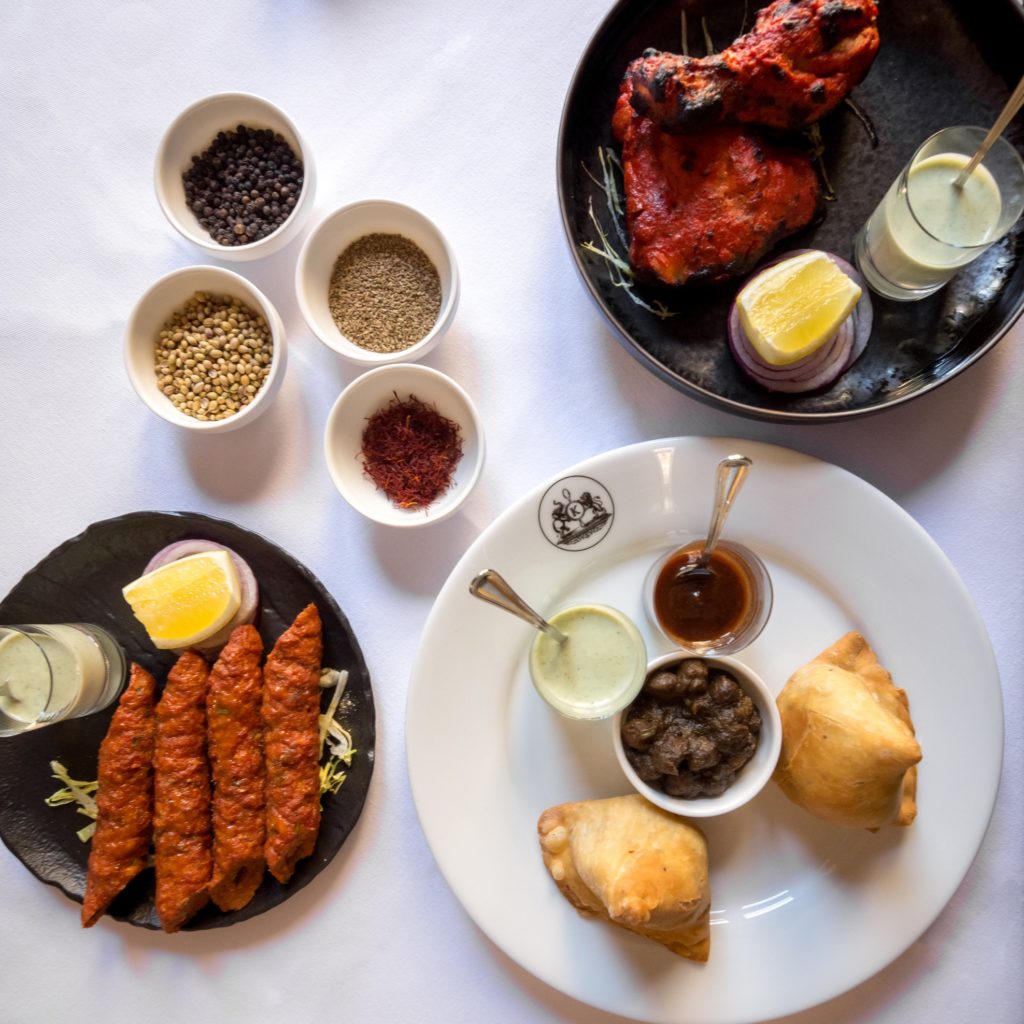
“I have a background in interior design and hospitality, so it made sense for me to combine these two interests. The details were important to me. Our logo consists of an elephant, to represent India, the tiger is taken from the Czech flag, the K stands for my hometown and the spoon facing up to the sky is from my mother who told me this represents good luck. I guess it worked because we are still serving six years later!”
As you sit down to dine on dishes bubbling with rich flavour, you’ll be watched over by a giant portrait of Maharaja Jagatjit Singh, a Kapurthala ruler. Everywhere you look you’ll be greeted by such lavish remnants of Punjabi history. The restaurant is styled after the royal palace, Sumit tells us. The hand-embroidered curtains, chairs, tiger rug, and even the bar were constructed in India.
The restaurant descends from an era when celebration of life, culture, luxury, open-mindedness, hospitality, and happiness all together were a must. Once you’ve soaked in the sparkling chandeliers, gems, and gold trimmings, it’s time to eat.
The Two Brothers offers an expansive menu of meat-based, vegetarian and vegan dishes, ranging from classic North Indian curries and side dishes to starters of pastries and tandoori shashlik. Head Chef Rony spent months learning from traditional chefs at an Indian cookery school to infuse authentic flavours into his dishes. It clearly worked – The Two Brothers has welcomed the likes of Katy Perry and Orlando Bloom, Jackie Chan, Karel Gott, and John Malkovich to dine in.

If you want to explore this Punjabi delight for yourself, treat yourself to their lunchtime special. A feast of curry, rice and naan will cost you just 169 Crowns, a deal you can grab between 11 am and 3 pm, Monday to Friday. Outside of these times, the restaurant is open 7 days a week, and Sumit is eager to serve you. “We’ve opened up a private room to help with social distancing while continuing our strict hygiene regime. We are offering takeaway for anyone who can’t make it into the restaurant, but we hope people will come to visit.”
You can follow The Two Brothers on Instagram or Like them on Facebook. See their full menu here.
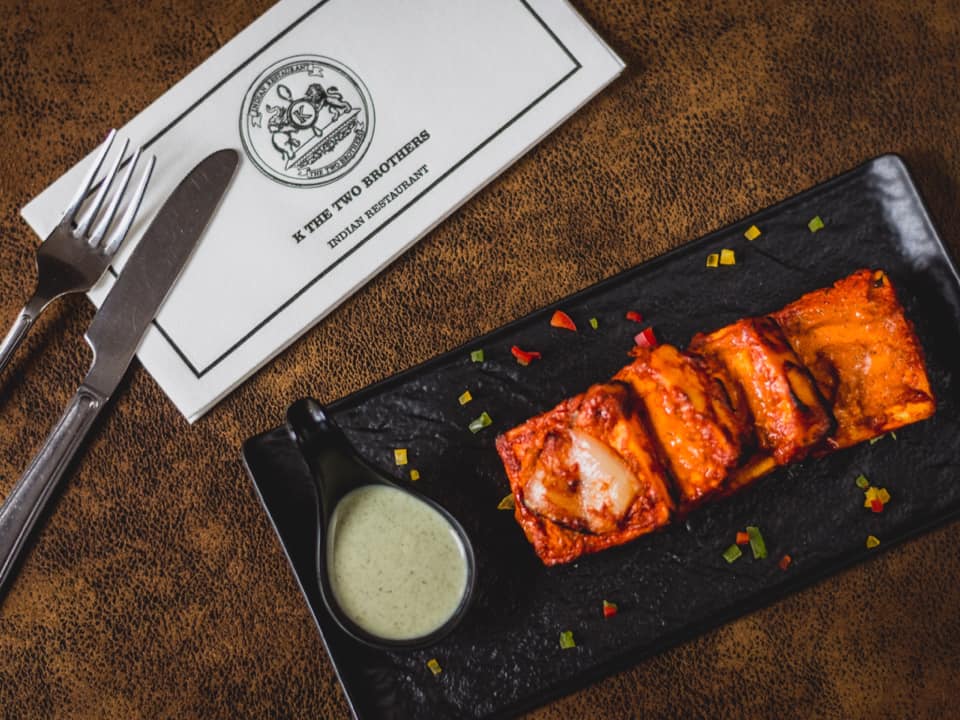
The Covid pandemic and the resulting worldwide lockdowns and travel restrictions hit Prague’s touristy industry hard. Many businesses have been forced to close.
Anyone strolling the eerily quiet streets in the city center will be unsurprised to learn that tourism in Prague has dropped by 80%, according to the Czech Statistical Office (ČSÚ).
Despite the restrictions, many countries stay on the low-risk or ‘green’ list for the Czech Republic, meaning the city is still welcoming tourists searching for a holiday in the midst of the pandemic. If you want to escape the city on the edge of lockdown, the Czech Republic has many beautiful spaces to offer that are largely unknown to tourists. Whether you’re looking for an autumnal getaway or planning ahead for the spring, we’ve put together a list of getaway destinations to explore without crossing borders:
Czech Canada Nature Reserve
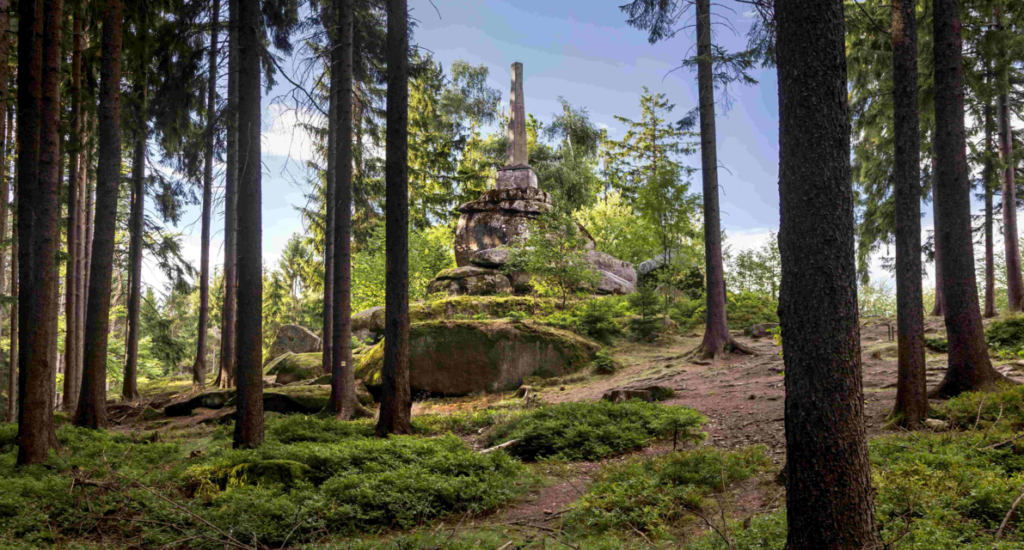
Situated in the south of the Czech Republic this beautiful woodland sits on the border intersection of three countries: Bohemia, Moravia and Austria. The reserve got its name from its climate, which is more extreme than the rest of the country with it’s higher precipitation and lower temperatures. You can expect high snowfall in the winter and relaxed heat in the summer months.
Czech Canada is truly a world of its own. You can scale hilly woodland before reaching plateaus of artificial lakes then hiking back up through it’s the biggest mountain, Vysoky Kamen. It’s worth educating yourself on the rich history this place has to offer.
The area has managed to remain largely untouched by industry developments, despite becoming became the scene of conflicts between the German, Jewish and Czech nationalities during and after World War II. Where else would you be able to bathe in an array of Roman, Gothic, Baroque and Renaissance art, cross lazily over borders, before ending the day in the beautiful village of Kunějov?
Novohradské Mountains
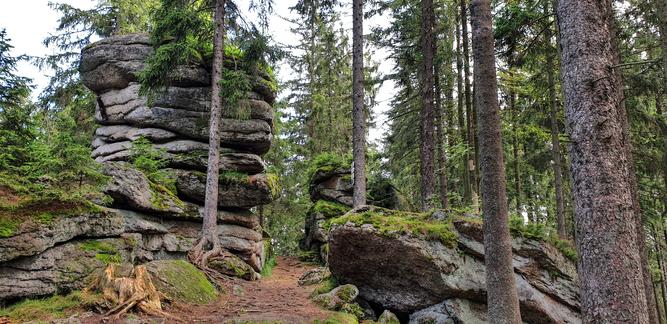
Kamenec Mountain
Known as the jewel of southern Bohemia, this mountain range offers a region of dense forests full of blueberries and crystal-clear streams. This isn’t a stroll for the casual walker, but a chance to lace up your hiking boots and set off in search of breathtaking views after navigating difficult rocky terrain. The Novohradské Mountains span the Czech-Austrian border, but there’s plenty to climb in Czech. There are three peaks which tower over 1000 meters above sea level: the Kamenec (1072 m), Myslivna (1040 m) and Vysoka (1034 m).
This place of magic is home to the oldest European nature reserve, the Hojnovodský and Žofín Forest, and the observation point on Kraví Mountain (953 m) that looks out over the pilgrimage site of Dobrá Voda (Good Water). Trust us, its worth the trek.
The Elbe River
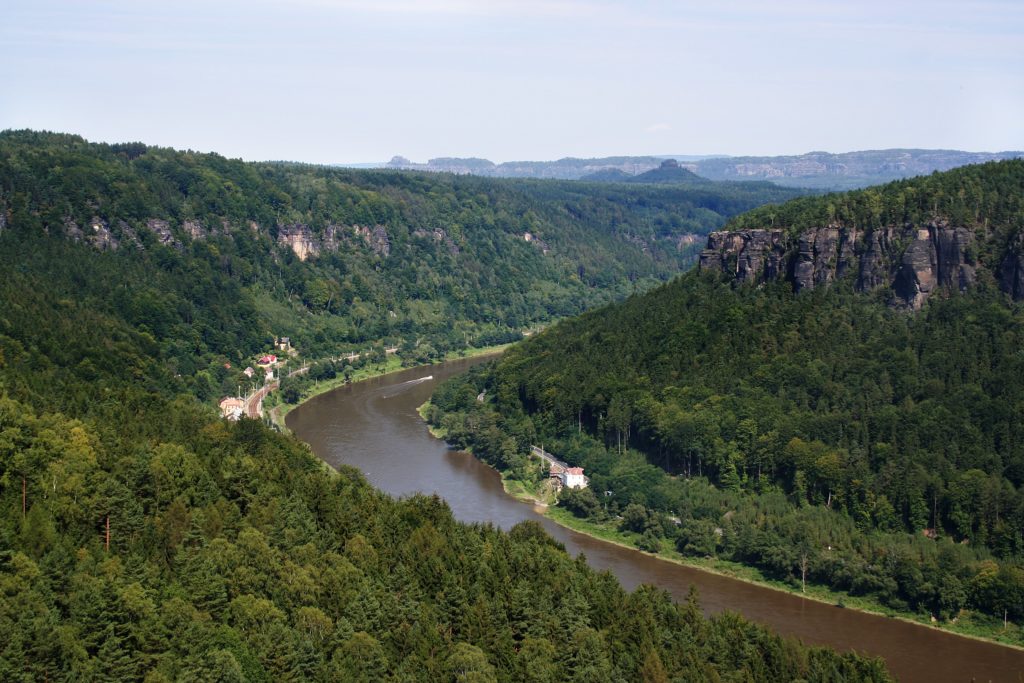
Hiking not really your thing? We recommend heading to the base of the Krkonoše Mountains in the north of the Czech Republic, where the Elbe River rises through it. This gorgeous flat landscape is perfect for a day of cycling.
We recommend planning your route to drink in the landscapes of the royal towns of Stará Boleslav and Brandýs nad Labem, the dug Poděbrady, retro Přerov nad Labem, the literary Hrabal Kersk and the Ostré. Looking for something luxurious? Pay a visit to the relaxing peat baths in the spa complex Lázně Toušeň.
